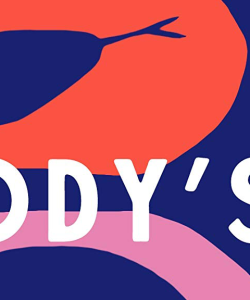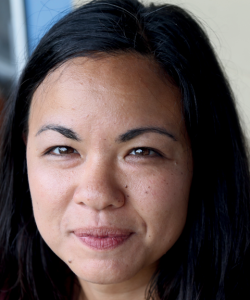GalleyCrush: Somebody’s Daughter

Ashley C. Ford’s Somebody’s Daughter, forthcoming from Flatiron Books on June 1, 2021.
Jump to navigation Skip to content

Ashley C. Ford’s Somebody’s Daughter, forthcoming from Flatiron Books on June 1, 2021.
“I most remember reading Chelsea Girls in the dark, in bars around San Francisco in the nineties—beneath the staircase in the backroom at Dalva, in a booth at Blondie's or the Uptown,” writes Michelle Tea in her Los Angeles Review of Books essay on reading the 1994 autobiographical novel by Eileen Myles, which influenced her as a writer, as well as a generation of queer writers. “What it was like to be female with that permeable body, to be a lesbian, to be working class or flat broke, to be a poet, a drunk,” writes Tea. “This is Chelsea Girls.” This week, write an essay about a book that was a formative influence on you as a writer. What was it about this book that helped you see yourself?
“Safe to say none of the other Muslim kids on the eastside of Columbus got MTV or BET in their cribs & we do at my crib sometimes like after Pops got a promotion or after Grandma moved in,” writes Hanif Abdurraqib in the long, energetic first sentence of his new book, A Little Devil in America: Notes in Praise of Black Performance (Random House, 2021), which is featured in Page One in the March/April 2021 issue of Poets & Writers Magazine. The book weaves together pieces that praise Black performance in America from Josephine Baker in mid-century Paris to the more intimate space of a living room in Columbus, Ohio. This week, inspired by Abdurraqib’s sharp reflections on culture, choose a moment in entertainment that has stuck in your mind and write an essay that praises and traces your connection to its legacy.
“It is so painful to be loved sometimes. Intolerable even.” In this 2020 virtual event hosted by Salve Regina University, Melissa Febos reads from her new essay collection, Girlhood (Bloomsbury, 2021), and answers questions about her writing process. A profile of Febos by Brian Gresko appears in the March/April issue of Poets & Writers Magazine.

“There were so many revelations I could only have reached through the process of putting memories on paper.” —Elizabeth Miki Brina, author of Speak, Okinawa
It’s hard to believe, but the end of February is almost here! With deadlines of either February 28 or March 1, these awards include opportunities earmarked for writers in Alabama and Mississippi, as well as two prizes for Black writers who self-published books last year. All feature a cash prize of $500 or more.
Alabama State Council on the Arts Literary Arts Fellowships: Fellowships of $5,000 each are given annually to poets, fiction writers, and creative nonfiction writers who have lived in the state of Alabama for at least two years. Deadline: March 1. Entry fee: none.
Association of Writers & Writing Programs Award Series: Two prizes of $5,500 each and publication by a participating press are given annually for a poetry collection and a short story collection. In addition, two prizes of $2,500 each and publication by a participating press are given annually for a novel and a book of creative nonfiction. Ilya Kaminsky will judge in poetry, Rebecca Makkai will judge in short fiction, Sabina Murray will judge in the novel, and Aimee Nezhukumatathil will judge in nonfiction. Deadline: February 28. Entry fee: $30 ($20 for AWP members).
Biographers International Organization Hazel Rowley Prize: A prize of $2,000 will be given annually for a work-in-progress by a writer who has not published a biography. The winner will also receive review of their manuscript by an agent, publicity through the Biographers International Organization (BIO) website, and a one-year membership in BIO. Writers who have not previously published, or who are not under contract to write, a book of biography, history, or other work of narrative nonfiction are eligible. Deadline: March 1. Entry fee: $25.
Black Caucus of the American Library Association Self-Publishing Literary Awards: Two prizes of $500 each are given annually for a poetry e-book and a fiction e-book by an African American writer self-published in the United States during the previous year. The awards honor books that depict the “cultural, historical, and sociopolitical aspects of the Black Diaspora.” Deadline: February 28. Entry fee: none.
Fish Publishing Flash Fiction Prize: A prize of €1,000 (approximately $1,170) and publication in the Fish Publishing anthology is given annually for a short short story. The winner is also invited to give a reading at the West Cork Literary Festival in July 2021. Kathy Fish will judge. Deadline: February 28. Entry fee: €14 (approximately $16) for online entries or €16 (approximately $18) for postal entries.
Hunger Mountain Literary Prizes: Three prizes of $1,000 each and publication on the Hunger Mountain website are given annually for a poem, a short story, and an essay. Tomás Q. Morín will judge in poetry, Trinie Dalton will judge in fiction, and Terese Marie Mailhot will judge in nonfiction. Deadline: March 1. Entry fee: $20.
Little Tokyo Historical Society Short Story Contest: A prize of $500 and publication in the Rafu Shimpo and on the Discover Nikkei and Little Tokyo Historical Society websites is given annually for a short story that takes place in the Little Tokyo district of Los Angeles. Deadline: February 28. Entry fee: none.
Mississippi Arts Commission Literary Artist Fellowships: Grants of up to $5,000 each are given in alternating years to Mississippi poets, fiction writers, and creative nonfiction writers. This year the fellowships will be offered in categories including creative nonfiction. Applicants must be permanent residents of Mississippi. Deadline: March 1. Entry fee: none.
Omnidawn Publishing First/Second Poetry Book Contest: A prize of $3,000, publication by Omnidawn Publishing, and 100 author copies is given annually for a first or second poetry collection. Kazim Ali will judge. Deadline: February 28. Entry fee: $27 ($30 to receive a book from the Omnidawn catalogue).
Tupelo Press Snowbound Chapbook Award: A prize of $1,000 and publication by Tupelo Press is given annually for a poetry chapbook. Denise Duhamel will judge. Deadline: February 28. Entry fee: $25.
University of Wisconsin Institute for Creative Writing Fellowships: An academic year in residence, which includes a stipend of at least $39,000, at the University of Wisconsin in Madison is given annually to at least five writers working on a first or second book of poetry or fiction. Writers with an MFA or PhD in creative writing who have not published more than one book are eligible. Deadline: March 1. Entry fee: $50.
Visit the contest websites for complete guidelines, and check out the Grants & Awards database and Submission Calendar for more contests in poetry, fiction, and creative nonfiction.
“First, the knees. They meet the gravel, the street, the blunt hips of curbs,” writes Melissa Febos in the prologue of her third book, Girlhood, published by Bloomsbury in March. The numbered essay titled “Scarification” includes detailed anecdotes ranging from childhood injuries with erasers to experiences with addiction. Febos captures “how these memories draw the constellation of your history” and turns the sentiment that “it is better to choose your pain than to let it choose you” into the final words of the essay: “You choose it, and it chooses you.” Write an essay that catalogues a history of your physical injuries and how you have confronted adversity. What similarities connect the various accounts, and what arc is there, if any, to this register?
“There’s nothing more riveting on the page than somebody willing to honestly tell what that life is,” says Joyce Maynard, author of the memoirs At Home in the World (Picador, 1998) and The Best of Us (Bloomsbury, 2017), about the roots of writing a memoir in this CreativeLive video.
The 2022 GrubStreet Muse & the Marketplace conference was held virtually with optional in-person events in and around GrubStreet’s Center for Creative Writing in Boston’s Seaport district, as public health guidelines allowed, from April 27 to May 1. From May 4 to May 8, the conference also conducted a Manuscript Mart, offering manuscript consultations with agents and editors via phone.
GrubStreet Muse & the Marketplace, P.O. Box 418, Arlington, MA 02476. (617) 695-0075. Preety Sidhu, Muse Conference Lead.
“What I have been thinking about, lately, is bewilderment as a way of entering the day as much as the work. Bewilderment as a poetics and an ethics,” writes Fanny Howe in “Bewilderment,” excerpted from a talk and published in the online journal How2 in 1999. Howe uses bewilderment as a way of understanding how the poem expresses the ineffable, claiming that it is “more than an attitude—but an actual approach, a way—to resolve the unresolvable.” Write a series of scenes in a personal essay that illustrate a time in your life when you were bewildered. How can one learn from the feeling of being perplexed or confused?